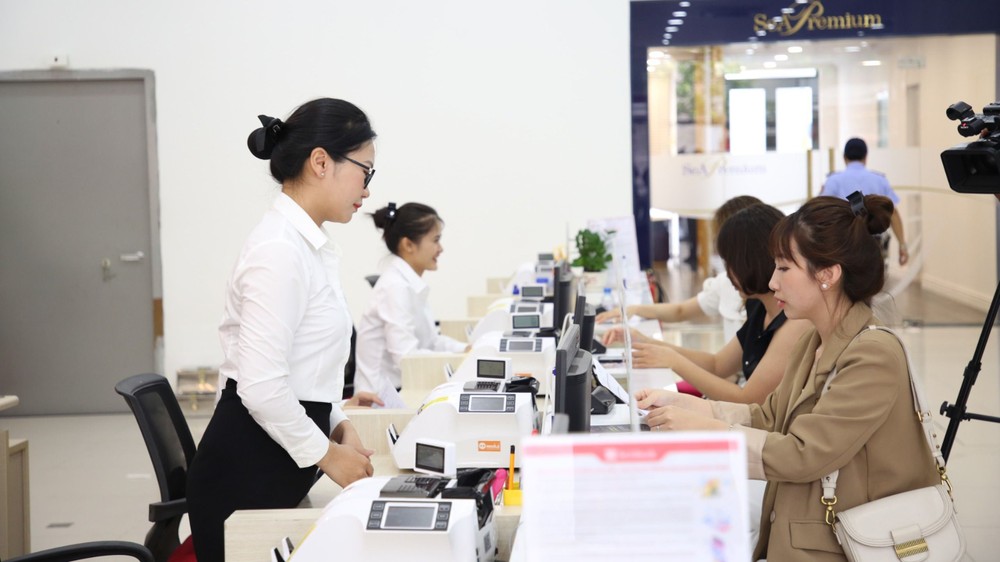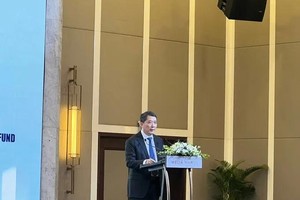
Credit on the rise
As of April 10, overall credit in the industry has increased by over 1 percent compared to the end of 2023, after negative growth in the first two months of 2024. According to Mr. Dao Minh Tu, Deputy Governor of the State Bank of Vietnam (SBV), this resurgence indicates that the economy is starting to absorb capital. Credit growth is expected to reach about 14-15 percent this year. In Ho Chi Minh City, as of the end of March 2024, the total outstanding loans in the city reached roughly VND3.58 trillion, up 1.9 percent from the previous month and up 0.96 percent from the end of 2023.
Mr. Nguyen Duc Lenh, Deputy Director of the SBV-Ho Chi Minh City Branch, noted that although credit in the first quarter of 2024 was lower compared to the same period in the last three years, the high credit growth of 1.9 percent in March 2024, following a negative growth of 0.93 percent in January and only a 0.01 percent increase in February, reflects the positive impact of the SBV's monetary policy management. It includes the low interest rate policies that have been stimulating production development and encouraging enterprises and business households to expand and develop business and production activities.
"If the current trends of economic and credit growth continue to perform well in April 2024 and the following months, it will lay the foundation for a new economic and credit growth cycle," noted Mr. Lenh.
Mr. Tran Hoai Nam, Deputy CEO of HDBank, also mentioned that their credit growth in the first three months of 2024 surged by 6 percent, equivalent to over VND20 trillion, with credit capital focusing on businesses in three key sectors, namely agriculture, manufacturing, and green credit.
Mr. Nguyen Dinh Tung, CEO of OCB, reported that their credit growth in the first quarter of 2024 reached 4.6 percent, much higher than the average of the banking industry. Notably, lending for the retail sector saw a positive rise of around 5 percent, while lending to import-export businesses also significantly increased. Additionally, there has been an improvement in personal lending, including loans for home purchases.
Mr. Nguyen Duc Lenh attributes the rebound of credit in Ho Chi Minh City to the real estate market's recovery, which has seen improved demand and transactions in recent months. This has had a ripple effect on consumer credit in the city. Notably, personal consumer loans from the VND20 trillion package, offered by consumer finance companies in Ho Chi Minh City at preferential interest rates, have disbursed VND259 billion to 10,554 borrowers.
In the first quarter, OCB's retail credit emerged by approximately 5 percent, driven largely by individual home purchases. ACB Bank experienced a 3.8 percent rise in personal credit during the same period, with home purchase loans constituting 30 percent, consumer loans 20 percent, and business production loans 50 percent.
According to the latest banking sector report by SSI Securities Corporation's Research Group, the secondary real estate market has shown better signs of recovery than anticipated. Transactions in the secondary real estate market have become more vibrant as banks roll out enticing interest rate packages for home purchases.
Low interest rates boost capital flow into the economy
The standout feature of the credit market in Q1-2024 is the widespread decrease in lending rates. Deputy Governor Dao Minh Tu revealed that the average interest rate for all new short-, medium-, and long-term loans in the entire system until the end of March 2024 is 6.5 percent per annum, down by 0.6 percent compared to the end of 2023. The average deposit interest rate is now 3 percent per annum, down 0.5 percent from the end of 2023.
"Currently, lending rates are at their lowest in 20 years. In instances where lending rates are perceived as high, the SBV has also mandated that commercial banks disclose their average lending rates to enable customers to opt for banks with lower interest rates," Deputy Governor Dao Minh Tu said.

Deputy Governor Dao Minh Tu emphasized that the SBV maintains a flexible approach to interest rate management, avoiding fixed directions for rate adjustments. Since late 2023, the SBV has consistently urged commercial banks to reduce costs and profits to lower lending rates for both new and existing loans.
With the economy showing signs of stability and some positive indicators, the SBV plans to uphold current interest rate levels at least through the first half of 2024. Experts anticipate that the current low interest rate level will stimulate economic recovery. Low interest rates will be effective when the economy rebounds.
However, Associate Professor – Dr. Pham Thi Thanh Xuan, Deputy Director of the Institute for Development and Research in Banking Technology at the University of Economics and Law, believes that it is necessary to maintain low interest rates for a sufficient period for them to have a substantial impact on the economy.
Additionally, the transparency of banks in publicly disclosing lending rates will contribute to further reductions in interest rates as banks must compete with each other. The lending rates at commercial banks are currently at low levels. Mr. Nguyen Dinh Tung revealed that OCB currently does not offer preferential loan packages, but its lending products have average interest rates ranging from 6 percent to 8 percent per annum.
Leveraging its retail banking prowess, an ACB representative also noted that the bank currently offers competitive interest rates, with rates for businesses ranging from 4 percent to 6 percent per annum and for individual customers from 6 percent to 8 percent per annum.
On April 19, in Hanoi, the SBV held a press conference for the first quarter of 2024. Deputy Governor Dao Minh Tu stated that thanks to the synchronized implementation of numerous solutions, as of March 29, credit in the economy had risen by 1.34 percent compared to the end of 2023. The SBV has maintained its benchmark interest rates after four reductions in 2023, given the global interest rates remained high, facilitating credit institutions' access to low-cost capital from the SBV.
According to the interest rate reports of banks, as of March 31, 2024, the average deposit interest rate for new transactions stood at 3.02 percent per annum, down 0.5 percent compared to the end of 2023. Meanwhile, the average lending interest rate for new transactions was 6.5 percent per annum, a decrease of 0.6 percent per annum from the end of 2023.













)

)








